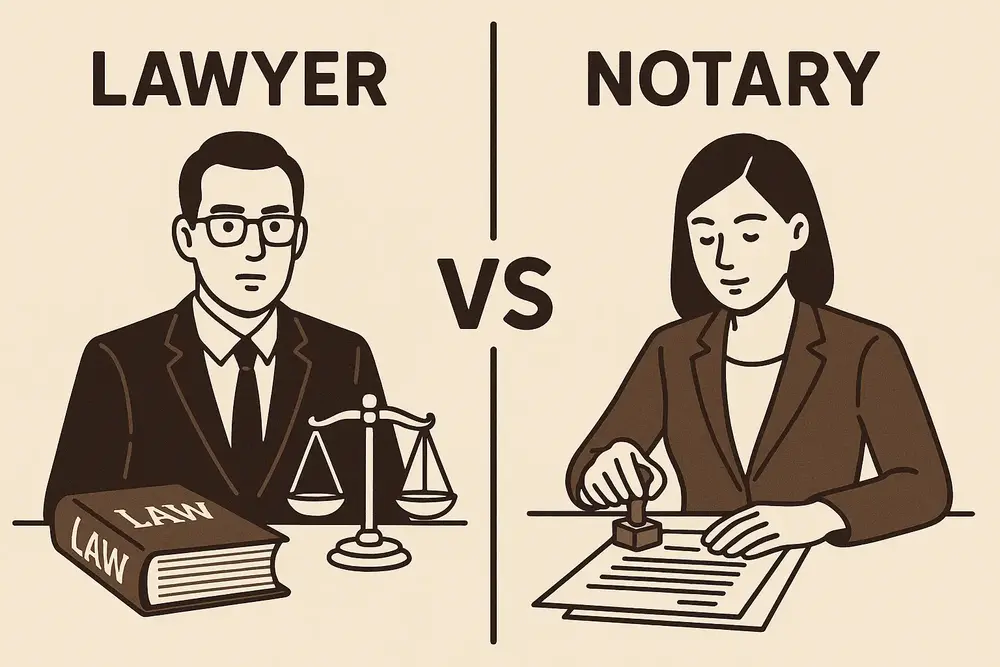
Have you ever wondered what makes a lawyer different from a notary? Most people think they are the same, but they play very different roles—especially in legal, business, and academic situations.
In this article, we’ll break down the differences between a lawyer and a notary using simple terms. Whether you’re a student, a business owner, or just someone curious, this guide will clear up the confusion and help you understand who to go to—and when.
What Is a Lawyer?
A lawyer (also called an advocate or attorney in some countries) is a legal professional who is trained to represent people or businesses in legal matters. Lawyers go to law school, pass bar exams, and are licensed to practice law in court.
What Can a Lawyer Do?
- Give legal advice on personal, business, or criminal matters
- Draft legal documents (e.g., contracts, wills, company policies)
- Represent clients in court
- Help in dispute resolution (such as land issues, divorce, labor disputes)
- Guide businesses in complying with legal rules
Real-Life Example:
If you’re starting a company and want to register it or create employee contracts, you hire a lawyer to do it right and avoid legal trouble later.
What Is a Notary?
A notary (or notary public) is a public official appointed by the government. Their job is mainly to witness the signing of documents and certify that the people signing them are who they say they are.
What Can a Notary Do?
- Verify your identity during signing
- Ensure you’re signing documents willingly and knowingly
- Stamp or seal documents to make them legally valid
- Notarize documents like affidavits, powers of attorney, agreements, and passport copies
- Assist in attestation for foreign use (like visa or study abroad)

Real-Life Example:
If you are applying for a student visa to Australia and need to submit notarized copies of your academic documents and citizenship, you’ll go to a notary, not a lawyer.
Key Differences: Lawyer vs Notary
Here’s a simple table to make the difference clearer:
| Feature/Role | Lawyer | Notary Public |
| Education | Law degree + license to practice | Short training + government license |
| Main Job | Legal advice and court representation | Document verification and certification |
| Court Appearance | Yes | No |
| Can Draft Contracts? | Yes | No (can only verify) |
| Fees | Higher, based on time and case | Fixed, as set by the government |
| Regulating Body (Nepal) | Nepal Bar Council | Nepal Notary Public Council |
| Common Users | Individuals, businesses, institutions | Students, travelers, visa applicants |
Why Students Need to Know This
If you’re a law or business student, knowing the difference between a lawyer and a notary is essential. Here’s why:
1. Understanding Career Paths
If you’re pursuing a law degree, you might choose to become a lawyer, but becoming a notary could be a faster, part-time side career while studying.
According to Tribhuvan University’s Law Campus, thousands of law graduates appear in bar exams every year, but not all practice full-time. Some combine law practice with notary services.
2. Visa and Scholarship Documents
Students applying abroad often need notarized transcripts, citizenship, birth certificates, and financial documents. This is not a lawyer’s job—it’s a notary’s task.
Why Businesses Should Care
For businesses, the confusion between a lawyer and a notary can lead to delays and legal errors. Here’s how knowing the difference helps:
1. For Legal Compliance
When a company is drafting MoUs, employment agreements, or shareholder policies, it should consult a lawyer.
2. For Document Verification
If the company is exporting goods and needs certified copies of trade documents or invoices, a notary is the right person.

How This Applies in the Classroom
This topic is also very relevant to classroom discussions—especially in law, business, or civic education courses.
In Business Studies:
Understanding how legal and notarized documents affect partnerships, loans, and contracts is crucial for future entrepreneurs.
In Law Courses:
Law students must learn how to distinguish roles—not every legal task requires litigation. Drafting and notarization are key pillars of non-litigation legal work.
Common Documents Handled by Each
Here are some common documents and who handles them:
| Document Type | Handled by Lawyer | Handled by Notary |
| Business Registration Forms |  Yes Yes |  No No |
| Passport & Citizenship Copies |  No No |  Yes Yes |
| Power of Attorney |  Draft Draft |  Verify Verify |
| Affidavits for Scholarship |  No No |  Yes Yes |
| Property Agreements |  Yes Yes |  No No |
| Visa Sponsorship Letters |  Draft Draft |  Notarize Notarize |
Tips to Remember
- Lawyers give advice and represent you legally.
- Notaries verify and certify documents.
- Need help drafting or resolving a legal problem? Call a lawyer.
- Need your documents certified for visa, travel, or banking? Visit a notary.
Final Thoughts
It’s easy to mix up lawyers and notaries, especially in countries like Nepal, where both play important roles in legal processes. But once you understand their different responsibilities, you can save time, money, and even avoid mistakes in important situations.
Whether you’re a student applying for a visa, a small business owner drafting contracts, or someone planning to study law, knowing who does what makes a big difference.

 9764569238
9764569238 Online | Privacy policy
Online | Privacy policy